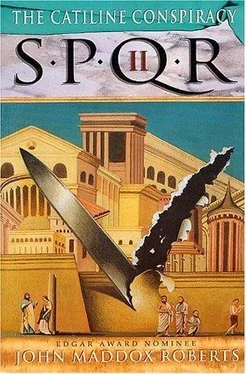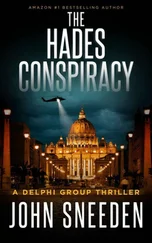John Roberts - The Catiline Conspiracy
Здесь есть возможность читать онлайн «John Roberts - The Catiline Conspiracy» весь текст электронной книги совершенно бесплатно (целиком полную версию без сокращений). В некоторых случаях можно слушать аудио, скачать через торрент в формате fb2 и присутствует краткое содержание. Жанр: Исторический детектив, на английском языке. Описание произведения, (предисловие) а так же отзывы посетителей доступны на портале библиотеки ЛибКат.
- Название:The Catiline Conspiracy
- Автор:
- Жанр:
- Год:неизвестен
- ISBN:нет данных
- Рейтинг книги:3 / 5. Голосов: 1
-
Избранное:Добавить в избранное
- Отзывы:
-
Ваша оценка:
- 60
- 1
- 2
- 3
- 4
- 5
The Catiline Conspiracy: краткое содержание, описание и аннотация
Предлагаем к чтению аннотацию, описание, краткое содержание или предисловие (зависит от того, что написал сам автор книги «The Catiline Conspiracy»). Если вы не нашли необходимую информацию о книге — напишите в комментариях, мы постараемся отыскать её.
The Catiline Conspiracy — читать онлайн бесплатно полную книгу (весь текст) целиком
Ниже представлен текст книги, разбитый по страницам. Система сохранения места последней прочитанной страницы, позволяет с удобством читать онлайн бесплатно книгу «The Catiline Conspiracy», без необходимости каждый раз заново искать на чём Вы остановились. Поставьте закладку, и сможете в любой момент перейти на страницу, на которой закончили чтение.
Интервал:
Закладка:
"Does anyone have a coin for the ferryman?" the priest asked. Fumbling in my purse, I came up with a copper as and tossed it to one of the attendants, who placed it beneath the dead man's tongue. It was the least I could do for the unfortunate man, who had relieved the tedium of my day.
As the libitinarii lifted the corpse onto a folding stretcher, I stooped and picked up the dagger. The man's toga was ruined anyway, so I used it to wipe off the blade. Then I thought of something. "Is there any way to tell how long he's been dead?" I asked the funeral-men.
"He's not quite cold," said one. "And he hasn't gone stiff yet. I'd say he hasn't been dead more than two or three hours."
As the body was borne away Octavius and I turned our steps toward the Forum. I held the dagger up so that he could see it. "This is evidence," I said. "I call on you to witness that I am not bearing arms within the pomerium."
He laughed. "If we enforced that one, the courts would have nothing else to do. What sort of dagger is it?"
I shrugged. It was not the broad-bladed pugio of the legions, but neither was it the curved sica most favored by the city cutthroats. It was straight and double-edged, with a thick midrib reinforcing the blade. The hilt was of plain bronze, the grip a piece of bone with a serpent carved on it, rather crudely. Winding its long body from the hilt to the pommel, the serpent formed a raised, spiral rib that afforded an excellent grip. The pommel was a plain, mushroom-shaped cap of bronze.
"Just an ordinary sticker as far as I can see," I told him. "The kind you can buy in any cutler's shop."
"Nothing of any real use as evidence, then," said Octavius. "Not as if the blade were engraved 'Death to the enemies of King Phraates of Parthia' or something of the sort."
"That would be convenient, but my experience of life has taught me that things are seldom ordered for our convenience." I tossed the dagger in the air and caught it again.
"Why, Decius, you've become a philosopher! Will you be growing a beard and opening a school?"
"Spare me, Octavius. Do keep me informed about this, will you? I almost feel that the poor fellow was my client, since I presided over the first part of his funeral rites." He promised to do so and we parted in the Forum.
It was a clear, cool day, one of those brilliantly lucid mornings such as one only encounters in Italy during the fall. The oppressive heat of summer was past and the chill and rains of winter had not yet begun. It made me have second thoughts about seeking an appointment that would take me out of Rome. I knew that winter would cure that. I would start thinking about the Greek islands, Africa, perhaps even an embassy to Alexandria, which I had always heard was a deliciously wicked city.
The day passed like all the others, save for the brief excitement of the morning. I found the staff waiting impatiently for me to unlock the treasury and I soothed them with a lurid account of the murder. I signed for yet another consignment of silver to the legions. I walked away when the tedious task of weighing a shipment of gold from Spain began.
I left the musty interior of the temple with its reek of old incense and older sacrifices and went out into the clean air of the city. Relatively clean, at any rate. The wind wasn't off the fish market or the slaughter yards or, worst of all, the open burial pits. It blew clean from the north, off the Alps. It was a pleasant waste of time, but it had to end and I turned toward my duties. Just within the entrance, I stopped. Something seemed to be wrong or out of place. I looked about me carefully. The statue of Saturn was as always. The pigeons nesting in the rafters cooed as usual. The temple was one of the most ancient, much of it still made of wood. There seemed to be nothing different about the various alcoves and doorways. My gaze stopped at the low doorway to the right of the entrance. It was the one old Minicius the state freedman had said led only to some disused storerooms. I walked over to it to see what was wrong.
There were fresh footprints in the dust, a great many of them. Had another train of slaves taken the wrong turn and gone in there? The question might not have concerned me had I not been so bored. Or perhaps it was because my mind was on mysterious matters such as, why had the murderer of Manius Oppius not stolen those rings, which were valuable enough to keep a poor family comfortable for two or three years? Or it might have been my genius whispering in my ear. Genii are supposed to be guardian spirits, but mine always gets me in trouble.
For the second time that day, I squatted to examine the evidence. There were prints of sandals and of bare feet. The bare feet probably belonged to slaves. I could see that at least two pairs of sandals had made prints, but little more than that. I straightened and looked around to see if anyone was observing me. I felt foolish, like a boy out climbing trees when he should be at his studies. Quietly, I went to a wall niche and took a lamp from it. Then I went back to the doorway.
The footprints were on a small landing, from which steep stairs slanted downward to the right. I descended the steps slowly, allowing my eyes to become accustomed to the dimness. By the time I reached the bottom, the illumination provided by the lamp's smoky wick was perfectly adequate. The stairs ended at another tiny landing, with barely enough room for a man to stand and turn around. Three doorways opened off the landing, one to each side and one straight ahead. The last of the steps and these three rooms were actually below the foundations of the temple, carved directly into the bedrock. It felt far older than the treasury rooms. It was a strange sensation, standing on a spot where Romulus might have stood.
I decided to try the room before me first. Ducking below the lintel, I went through and found myself in a small, cramped chamber. Its walls were decorated with faded paintings of gods and demons in the Etruscan style. On one wall, a blindfolded man was being savaged by a dog or wolf held on a leash by a figure with the long nose and ears of a death-demon. On another, two naked men were locked in mortal combat while men and women in priestly raiment looked on. One combatant grasped his opponent around the neck and thrust his sword through his body while the other's sword pierced the victor's thigh. Blood gushed profusely from both wounds. On the third wall, a warrior in antique armor grasped the hair of a bound prisoner seated on the ground before him and drew his sword across the; victim's throat.
I like to think that I am not superstitious, but these ancient paintings filled me with horror. Were these long-forgotten rites of worship once demanded by Saturn? Were they scenes from the dedication of the temple? It was not the mere bloodshed,, which was a common enough sight. It was the ritual, religious nature of it. We were fond of our gods as patrons of agriculture or craft or war, but we had little liking for the blood-drinking gods of the underworld. Our ancestors had not been so squeamish.
I would have to bring Cato down here, I thought. He would probably petition the Senate for a return to human sacrifice, since it had been the custom of our ancestors.
There was a heap of something on the floor, covered by a large piece of cloth. Behind me, next to the doorway, I found a lamp-niche and placed my lamp in it. Then I stooped and drew the cloth back. The flame glittered off a great deal of metal. It was a heap of weapons. The majority were swords and short spears. I saw the stout gladius of the legions in many styles, some recent, others dating back as far as Scipio and the Punic wars. There was the long spatha of the cavalry and the many shapes of sword used in the amphitheater. Some of the spears were hunting weapons such as broad-bladed boar spears. Others were military, the light javelin and the heavy pilum of the legions. Once again, these last were mostly of older design.
Читать дальшеИнтервал:
Закладка:
Похожие книги на «The Catiline Conspiracy»
Представляем Вашему вниманию похожие книги на «The Catiline Conspiracy» списком для выбора. Мы отобрали схожую по названию и смыслу литературу в надежде предоставить читателям больше вариантов отыскать новые, интересные, ещё непрочитанные произведения.
Обсуждение, отзывы о книге «The Catiline Conspiracy» и просто собственные мнения читателей. Оставьте ваши комментарии, напишите, что Вы думаете о произведении, его смысле или главных героях. Укажите что конкретно понравилось, а что нет, и почему Вы так считаете.










